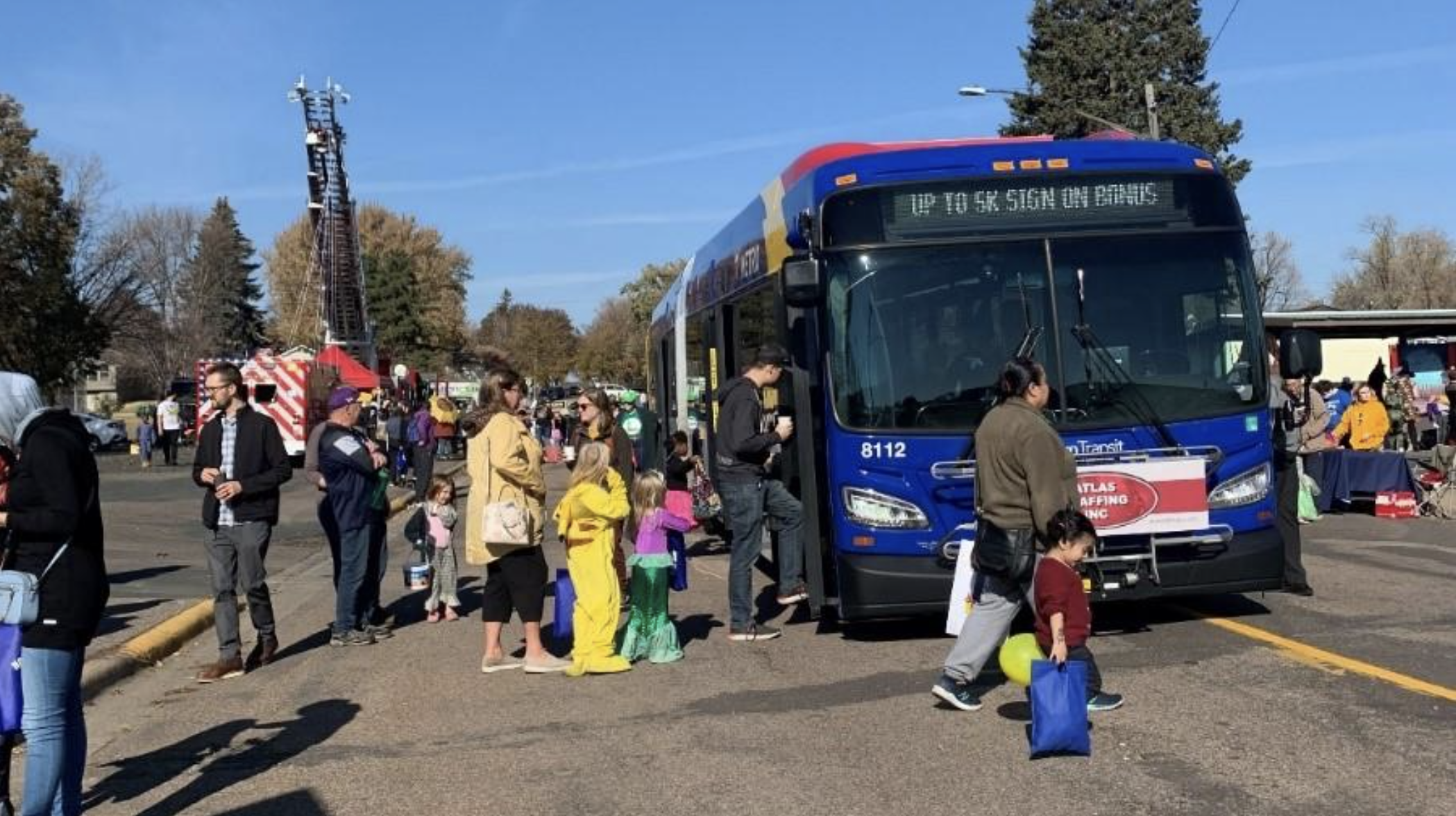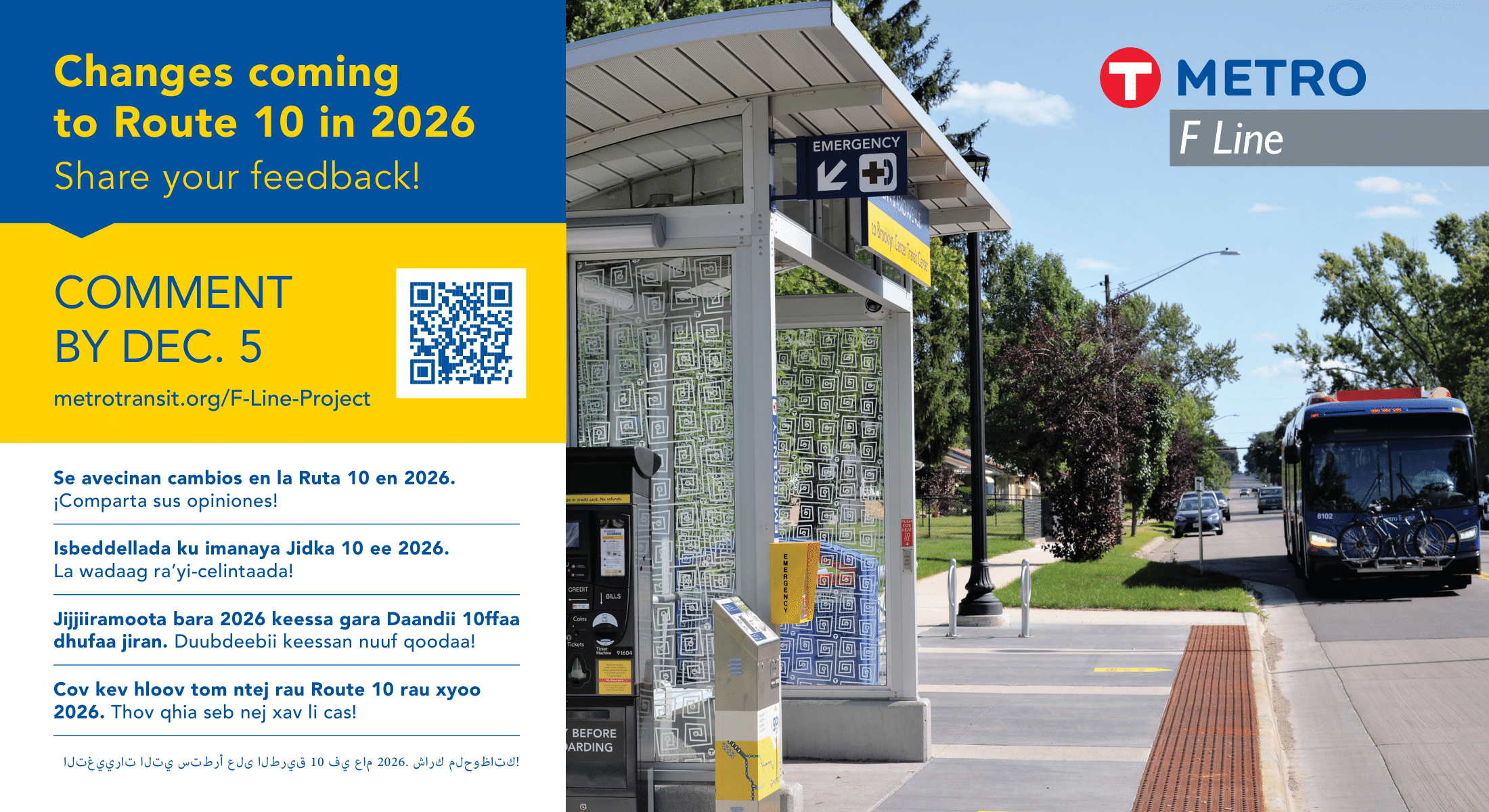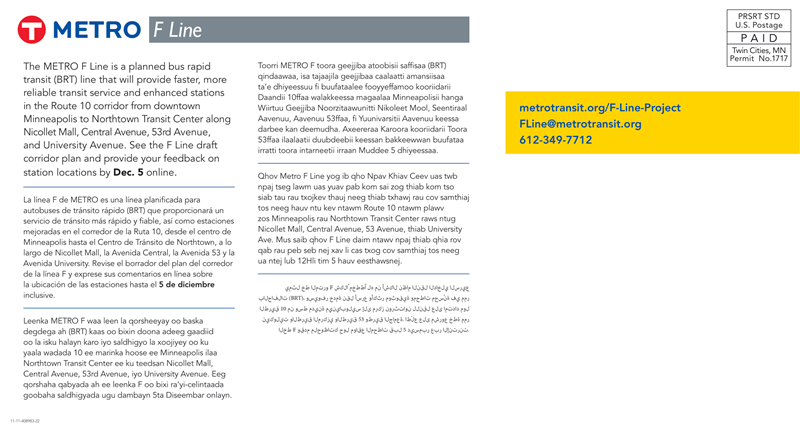Public Engagement
The purpose of F Line project outreach and engagement is to build broad community awareness and incorporate a range of community needs, concerns, and priorities into the planning and implementation process. It will use an equitable and transparent approach that reduces potential barriers to participation. Public engagement for the F Line project is led by a dedicated Metro Transit community outreach coordinator and supported by the broader F Line project team.
Metro Transit’s community outreach coordinators focus on building relationships with communities to engage riders, residents, businesses, and other stakeholders on transit improvement projects like the F Line. The F Line outreach coordinator connects people to the F Line project to share information, engage in two-way conversations, respond to questions and comments, and help incorporate input to be reflected in project outcomes.
As Metro Transit engages community partners along the F Line corridor, we will consider barriers such as stakeholders’ ability to participate, language, literacy, disability, and accessibility of information, and adjust our messaging to ensure our engagement efforts are inclusive and reflect communities who live, work, and travel along the corridor.
Translation and alternative formats
Project fact sheets are available in in Spanish, Somali, Hmong, Oromo, and Arabic. If you need materials in a different format or additional language, please contact [email protected] or 651-829-5305.
Engineering phase engagement
Engineering for the F Line is currently underway. During this phase, specific details including the precise location of shelters and other amenities within station areas will be determined. Preliminary station design plans are under development and will be shared in 2024. When these plans are available, project staff will seek input from riders, future station neighbors, and the public about the placement of shelters, pylons, and other amenities within each station area.
Stay engaged and subscribe to the F Line Update to get project news delivered to your inbox.
Planning phase engagement
In 2020 and 2021, Metro Transit conducted technical analysis and engaged the public to identify the region's next arterial BRT priorities as part of the Network Next project.
In February 2021, Metro Transit finalized recommendations for the METRO F, G, and H lines of the BRT network. The Central Avenue corridor was recommended as the F Line, with BRT service largely replacing Route 10 from downtown Minneapolis to Northtown Mall, primarily via Central and University avenues. The Metropolitan Council adopted these recommendations in March 2021. In March 2022, the F Line was adopted by the Metropolitan Council into the 2040 Transportation Policy Plan.
Beginning in early 2022, Metro Transit worked closely with city, county, state, and other agency partners to develop proposed F Line station locations and coordinate overlapping projects. This work has resulted in the F Line Corridor Plan.
The purpose of the F Line Corridor Plan is to identify the locations of stations and platforms for the F Line arterial BRT project. The corridor planning process provides opportunities for effective agency coordination and meaningful public engagement on the F Line stations and platforms, including two public engagement periods following the release of the Draft Corridor Plan and Recommended Corridor Plan prior to final approval.
In 2022-2023, we sought public feedback on planned F Line station locations in three steps:
-
Fall 2022 - Draft Corridor Plan: Metro Transit released the Draft Corridor Plan, initiating a six-week public comment period, which ended on Dec. 5, 2022. Feedback from the public and agency partners is summarized and incorporated into the Recommended Corridor Plan.
-
Spring 2023 - Recommended Corridor Plan: The Metropolitan Council approved the release of the Recommended Corridor Plan on April 12, initiating a second public comment period lasting through May 14, 2023. This second version of the Corridor Plan includes a summary of what we heard and how we updated the Draft Corridor Plan to reflect public and agency input.
-
Summer 2023 - Final Corridor Plan: Feedback collected on the Recommended Corridor Plan was incorporated into a Final Corridor Plan that was approved by the Metropolitan Council on Aug. 9, 2023. Approval of the plan allowed the project to move into the engineering phase, where specific details including the precise location of shelters and other amenities within station areas will be determined.
Public engagement completed for the Draft and Recommended versions of the Corridor Plan
Metro Transit released the Draft Corridor Plan on Oct. 24, 2022, starting a public comment period that lasted until Dec. 5, 2022. During this time, Metro Transit staff engaged riders and community members through a variety of means to gather feedback on the Plan and learn from their experiences.
Project staff revised the draft document based on feedback received and ongoing interagency coordination. This was summarized and incorporated into a Recommended Corridor Plan, which was shared for an additional round of public outreach and engagement. The Recommended Corridor Plan public comment period occurred April 12 through May 14, 2023.
The full Draft Corridor Plan and Recommended Corridor Plan documents, individual station plans, and presentations and meeting materials were available to view online, and a comment survey form, project email address ([email protected]), and phone number (651-829-5305) were also made available for the public to submit comments.
Release of the Draft Corridor Plan and Recommended Corridor Plan were communicated through print, digital, and in-person communications. Metro Transit used the following strategies during both public comment periods:
- Provided translations of vital documents in English, Spanish, Somali, Hmong, Oromo, and Arabic
- Mailed postcards to 12,900 homes, businesses, and those who own property within one-half mile of the F Line
- Posted signs at 99 Route 10 bus stops along the corridor
- Door knocked 149 properties near proposed F Line station locations, speaking with neighbors and/or distributing project information
- Sent multiple email updates to over 13,000 addresses signed up for the F Line Update newsletter, Metro Transit Rider Alerts, or Riders Club distribution lists, and Route 10 Go-To Card users
- Completed four rounds of social media advertisements targeted at zip codes along the F Line corridor
- Worked with partner agencies to share project information via more than 20 newsletters, websites, and social media postings
- Engaged 874 people at 40 events and meetings hosted by community organizations and neighborhood groups, which also shared project information via their networks
- Hosted an online open house on Nov. 15, 2022, to share information, collect comments, and answer questions
Metro Transit received over 850 comments on the Draft and Recommended versions of the Corridor Plan and incorporated them into a Final Corridor Plan that was approved by the Metropolitan Council on Aug. 9, 2023. A complete summary of comments received, including by key themes, is included in Appendix A: Corridor Plan Comment Summary of the Final Corridor Plan.


